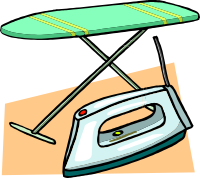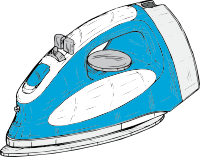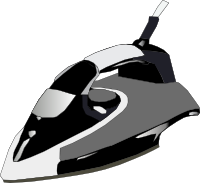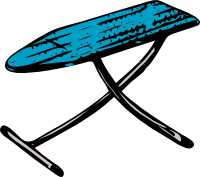Associations to the word «Iron»
Noun
- Manganese
- Nickel
- Ore
- Magnesium
- Zinc
- Anemia
- Iron
- Oxide
- Furnace
- Sulfide
- Sulfur
- Steel
- Foundry
- Titanium
- Copper
- Tin
- Bronze
- Meteorite
- Phosphorus
- Stirrup
- Alloy
- Aluminium
- Calcium
- Mineral
- Hydroxide
- Rust
- Sulfate
- Potassium
- Deficiency
- Iodine
- Sulphur
- Graphite
- Vitamin
- Coal
- Anvil
- Carbon
- Metal
- Brass
- Oxidation
- Branding
- Silica
- Corrosion
- Phosphate
- Utensil
- Blacksmith
- Hoop
- Forge
- Stove
- Carbonate
- Impurity
- Grate
- Magnet
- Fe
- Coke
- Silicon
- Lime
- Precipitate
- Shipbuilding
- Truss
- Leather
- Deposit
- Salt
- Cement
- Absorption
- Nail
- Uptake
- Rod
- Timber
- Quartz
- Kettle
- Chloride
- Asbestos
- Tonne
Adjective
Pictures for the word «Iron»
Wiktionary
IRON, noun. (uncountable) A common, inexpensive metal, often black in color, that rusts, is attracted by magnets, and is used in making steel.
IRON, noun. (uncountable) (physics) (chemistry) (metallurgy) A metallic chemical element having atomic number 26 and symbol Fe.
IRON, noun. (uncountable) (countable) (metallurgy) Any material, not a steel, predominantly made of elemental iron.
IRON, noun. (countable) A tool or appliance made of metal, which is heated and then used to transfer heat to something else; most often a thick piece of metal fitted with a handle and having a flat, roughly triangular bottom, which is heated and used to press wrinkles from clothing, and now usually containing an electrical heating apparatus.
IRON, noun. (usually plural, irons) Shackles.
IRON, noun. (slang) A handgun.
IRON, noun. (uncountable) A dark shade of the colour/color silver.
IRON, noun. (Cockney rhyming slang) (shortened from iron hoof) (rhyming with poof; countable) (offensive) A male homosexual.
IRON, noun. (golf) A golf club used for middle-distance shots.
IRON, noun. (uncountable) Great strength or power.
IRON, adjective. (not comparable) Made of the metal iron.
IRON, adjective. (figuratively) Strong (as of will), inflexible.
IRON, verb. (transitive) To pass an iron over (clothing or some other item made of cloth) in order to remove creases.
IRON, verb. (transitive) (archaic) To shackle with irons; to fetter or handcuff.
IRON, verb. (transitive) To furnish or arm with iron.
IRON AGE, proper noun. (mythology) The most recent and debased of the four or five classical Ages of Man; hence, any period characterised by wicked behaviour. [from 16th c.]
IRON AGE, proper noun. An age characterised by the use of iron. [from 16th c.]
IRON AGE, proper noun. (archaeology) A level of culture in which Man used iron and the technology of ironworking. (Estimated to have begun in Europe about 1100 BCE) [from 19th c.]
IRON AGE, proper noun. Alternative letter-case form of Iron Age
IRON BACTERIA, noun. Plural of iron bacterium
IRON BACTERIUM, noun. Any of a group of bacteria that oxidize ferrous iron to ferric iron
IRON BAND, noun. (music) (Antigua and Barbuda) A kind of traditional musical group in the folk culture of Antigua and Barbuda, characterized by the use of pieces of metal that can be played as musical instruments.
IRON BANDS, noun. Plural of iron band
IRON BLOOM, noun. A mixture of fine iron particles, unreacted iron oxide (ore), slag and charcoal residue.
IRON BOMB, noun. (military aviation) a dumb bomb, a type of gravity bomb, an unguided bomb dropped from an aircraft
IRON BOMBS, noun. Plural of iron bomb
IRON CAGE, noun. (sociology) A theory proposed by Max Weber which argues that rationalization and rules trap humans in a figurative "cage" of thought.
IRON CARBIDE, noun. (metallurgy) A compound of iron with carbon (Fe3C).
IRON CEMENT, noun. A cement for joints, composed of cast-iron borings or filings, sal ammoniac, etc.
IRON CROSS, noun. (gymnastics) A position on the rings where the gymnast holds the rings straight out on either side of the body.
IRON CROSS, noun. (sports) (moguls freestyle skiing) an acrobatic maneuver where the skier remains upright, but the lower leg bends back at the knee 90 degrees, and the ankles twist 45 degrees, so that the back of the skis form a right-angle cross
IRON CROSS, proper noun. (military) (formerly) the second highest military decoration of Germany, under the military order of the Pour le Mérite
IRON CURTAIN, proper noun. (historical) The dividing line between Western Europe and the Soviet controlled regions, especially during the Cold War.
IRON CURTAIN, noun. A barrier made of iron in the theatre, lowered between the stage and the auditorium for safety or to prevent communication.
IRON CURTAIN, noun. (idiomatic) Any impenetrable barrier.
IRON CURTAINS, noun. Plural of iron curtain
IRON EAGLE, noun. (idiomatic) (US) (military) An American military officer who has attained the rank of colonel but will not be promoted to the rank of general.
IRON FILINGS, noun. Small fragments of iron, filed from a bar; used to visualize the presence of a magnetic field, and as a food additive
IRON FIST, noun. Ruthless and usually unrestricted control.
IRON FIST, noun. Symbol of an army's tank or cavalry branch.
IRON FISTS, noun. Plural of iron fist
IRON FLINT, noun. An opaque, flint-like, ferruginous variety of quartz.
IRON GRAY, noun. A dark grey colour, with a tint of green.
IRON GRAY, adjective. Of a dark grey colour, with a tint of green.
IRON GROUP, noun. (inorganic chemistry) Group 8 of the periodic table, comprising iron, ruthenium, osmium and hassium
IRON GUM, noun. (AU) Any of various eucalypts of eastern Australia known for their hard wood.
IRON HAND, noun. (figuratively) Firmess, inflexibility, sternness.
IRON HANDED, adjective. Alternative form of ironhanded
IRON HANDEDLY, adverb. Alternative form of ironhandedly
IRON HANDEDNESS, noun. Alternative form of ironhandedness
IRON HOOF, noun. (Cockney rhyming slang) A poof (a male homosexual).
IRON HORSE, noun. (transport) A railroad steam locomotive.
IRON HORSES, noun. Plural of iron horse
IRON LIQUOR, noun. A solution of an iron salt, used as a mordant by dyers.
IRON LUNG, noun. A pneumonic device for assisted breathing.
IRON MAIDEN, noun. (archaic) A medieval torture device consisting of a chamber lined with spikes which encloses upon and impales the victim inside.
IRON MAIDENS, noun. Plural of iron maiden
IRON MAN, noun. (sports) Alternative form of ironman
IRON MAN, noun. A self-acting spinning mule used in cotton manufacture.
IRON METEORITE, noun. (geology) Any of a class of meteorite that is composed mostly of iron and nickel alloys
IRON MINE, noun. A mine from which iron ore or ferriferous minerals are mined.
IRON MINES, noun. Plural of iron mine
IRON MOULD, noun. The yellow discoloration of cloth by rusty iron.
IRON ORE, noun. (mineralogy) (especially mining) A mineral deposit from which iron can be viably extracted.
IRON OUT, verb. To remove (a crease or creases) with an iron.
IRON OUT, verb. (idiomatic) To resolve (a dispute); to solve (a problem).
IRON OXIDE, noun. (chemistry) The compound obtained by the reaction of oxygen on iron. Either iron(II) oxide (old term ferrous oxide, chemical formula FeO) or iron(III) oxide (old term ferric oxide, chemical formula Fe2O3). Generally known as rust when hydrated.
IRON OXIDES, noun. Plural of iron oxide
IRON RATION, noun. (historical) An emergency ration given to soldiers in the early 20th century, consisting of cakes made from beef bouillon powder and wheat; chocolate; and packets of salt and pepper.
IRON RATIONS, noun. Plural of iron ration
IRON RICE BOWL, noun. A guaranteed state job in China that lasts until retirement and pays a pension until death.
IRON RICE BOWLS, noun. Plural of iron rice bowl
IRON SAND, noun. An iron ore in grains, usually the magnetic iron ore, formerly used to sand paper after writing.
IRON SCALE, noun. The thin film that forms on the surface of wrought iron in the process of forging. It consists essentially of the magnetic oxide of iron.
IRON TRIANGLE, noun. (US) (politics) The policy-making relationship among the congressional committees, the bureaucracy (executive) (sometimes called "government agencies"), and interest groups.
IRON TRIANGLE, noun. Any self-reinforcing power structure, whether intentional or accidental, formal or informal.
IRON VITRIOL, noun. (obsolete) (chemistry) iron(II) sulfate
Dictionary definition
IRON, noun. A heavy ductile magnetic metallic element; is silver-white in pure form but readily rusts; used in construction and tools and armament; plays a role in the transport of oxygen by the blood.
IRON, noun. A golf club that has a relatively narrow metal head.
IRON, noun. Implement used to brand live stock.
IRON, noun. Home appliance consisting of a flat metal base that is heated and used to smooth cloth.
IRON, verb. Press and smooth with a heated iron; "press your shirts"; "she stood there ironing".
IRON, adjective. Extremely robust; "an iron constitution".
Wise words
He who speaks without modesty will find it difficult to make
his words good.













